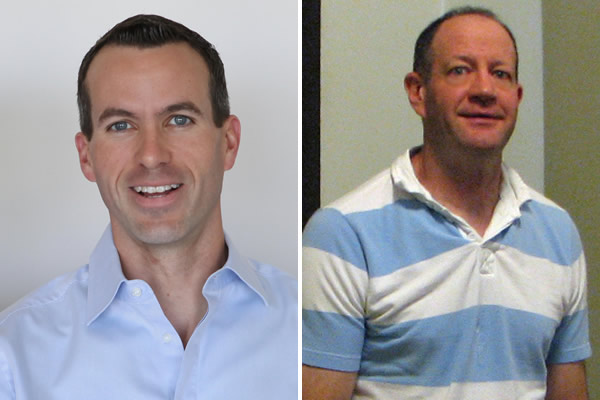Sports
OutSports’ next play
10 years after debut, gay sports site acquired by SB Nation


Cyd Zeigler (left) and Jim Buzinski have guided OutSports through 10 years of change, and see their acquisition by SB Nation as the next chapter in their story. (Photos courtesy Zeigler and Buzinski)
For more than 10 years, OutSports.com has been a leader in sharing stories from the amateur and professional sports world with a decidedly gay point of view.
“OutSports definitely fills a needed niche within the realm of sports,” says avid sports fan and gay man, Ken Nash. “If you’re wanting news about the gay boycott of Sochi or events like the Gay Games, it’s the first site people go to.”
Three years before creating OutSports.com, gay sports enthusiasts and flag football players Cyd Zeigler and Jim Buzinski met playing in the Los Angeles league in the late 1990s. They bemoaned the lack of an LGBT voice in coverage of sports news, and it dawned on them to fill the void themselves.
FIND MORE OF THE WASHINGTON BLADE SPORTS ISSUE HERE.
“Why don’t we just do this thing called a website,” Buzinski told the Blade, who said Zeigler came up with the name “OutSports” when the pair discovered gaysports.com was taken. “Once he said it, it was like ‘oh, that’s it,’ and we never went back.”
In March, OutSports — which has grown from a small site with pages dedicated to the promotion of gay sports into a reputable news source that covers all aspects of LGBT issues in sports — was acquired by Vox Media, a Washington, D.C.-based web publishing company, and became part of their flagship site, SB Nation. Buzinski and Zeigler maintain creative and editorial control.
“People were afraid that becoming part of a mainstream publication would mean that OutSports is going to be de-gayed, and that has not been the case,” Zeigler told the Blade about SB Nation — a massive site of sports-related community-driven editorial content. “The fact that a mainstream publication wanted to acquire a very gay website says a lot about where sports media is today and where this company is today.”
Buzinski and Zeigler began to consider joining a larger organization several years ago, and reached out to several other LGBT publications, but after the New York Times profiled the pair in April 2011, SB Nation reached out to the two pioneering gay sports bloggers.
Sports fans are coming out of the closet en masse in the LGBT community recently, and cities like Washington D.C., Los Angeles, Chicago and New York have seen an explosion of amateur LGBT leagues in every sport imaginable. But when the duo met in 1998, gay sports fans were less open about their passion.
“It’s an area that older gay people shunned for a variety of reasons, a lot of it legitimate,” Buzinski says about why organized sports were not considered a part of the LGBT identity in the early years of the site.
“It felt like you almost had to defend yourself for being a sports fan. Because people would talk about how bullying the culture was, and you felt like ‘I just love the sport, I love the action, I love the players,’” Buzinski continued. “They just didn’t feel a part of it or accepted — except for sports like softball, which has had gay teams forever — but now it seems that every city has dozens of teams of active gay clubs. So I think at the recreational level, people are saying, ‘Hey, we can be in any field. We’re not restricted.’”
Buzinski and Zeigler say the Internet, and sites like OutSports have helped change the perception of organized sports in the LGBT community, as well as change the perception of LGBT athletes in the community of athletics.
“As a huge gay sports fan growing up, [OutSports] seemed like one of the only places where you could actually find sports news from an LGBT perspective, and also find other openly gay sports fans,” Change.org senior campaign director and longtime reader, Michael Jones, told the Blade. “I definitely think the site has had a tremendous amount of influence in getting outlets like Sports Illustrated, Sporting News, ESPN and more to cover LGBT issues in sports.”
Buzinski and Zeigler see the partnership with SB Nation as a sign of a changing landscape in sports media, where a general sports audience is more open to and interested in stories of LGBT athletes, and gay sports fans will continue to be “de-ghettoized,” as Zeigler says.
“I think having a partner like SB Nation gives us more resources to do things that we’ve not been able to do until now,” Buzinski says.
The vibe and feel of OutSports has changed since it was acquired by SB Nation, and it now has a much more polished, Grantland-esque feel to it than a charming and scrappy blog,” says Change.org’s Jones. “But looks aside, I’ve still enjoyed the content, still visit the site multiple times a week, and still hope that the exposure stories on OutSports get among the fans of SB Nation open up LGBT sports coverage to even greater numbers of readers, particularly straight readers, who haven’t been used to reading about the lives of LGBT people in the sports world.”
Zeigler says that as LGBT sports issues change, OutSports will continue to evolve at its new home.
“We cover things differently than we did 10 years ago, and five years from now we’ll cover things differently,” he tells the Blade. “With SB Nation, we’re not just read by a mostly gay audience anymore, we’re now read by a lot of straight people. ”
That means the ability to expose a mainstream audience to new issues, and bring wider attention to ways athletics is adapting to an era of the out and open athlete.
“Transgender people are misunderstood, but transgender athletes have the furthest to go [in terms of acceptance in sports],” Zeigler says about one of the next LGBT issues needing to be tackled. “I think we need education in terms of what it means to transition in the sports world.”
Zeigler also sees casual homophobia as a problem.
“I think this is the No. 1 problem. I think systemic homophobia is not really the issue here, it’s the perception of homophobia in sports,” Zeigler says. “And heterosexism.”
OutSports avoids trying to be all things to everyone, but concentrates on shedding light on issues of interest of LGBT athletes and fans.
“For more substantive game-by-game analysis, I prefer ESPN but that isn’t what OutSports tries to be,” sports fan Ken Nash says.

More than a dozen LGBTQ athletes won medals at the Milan Cortina Winter Olympics that ended on Sunday.
Cayla Barnes, Hilary Knight, and Alex Carpenter are LGBTQ members of the U.S. women’s hockey team that won a gold medal after they defeated Canada in overtime. Knight the day before the Feb. 19 match proposed to her girlfriend, Brittany Bowe, an Olympic speed skater.
French ice dancer Guillaume Cizeron, who is gay, and his partner Laurence Fournier Beaudry won gold. American alpine skier Breezy Johnson, who is bisexual, won gold in the women’s downhill. Amber Glenn, who identifies as bisexual and pansexual, was part of the American figure skating team that won gold in the team event.
Swiss freestyle skier Mathilde Gremaud, who is in a relationship with Vali Höll, an Austrian mountain biker, won gold in women’s freeski slopestyle.
Bruce Mouat, who is the captain of the British curling team that won a silver medal, is gay. Six members of the Canadian women’s hockey team — Emily Clark, Erin Ambrose, Emerance Maschmeyer, Brianne Jenner, Laura Stacey, and Marie-Philip Poulin — that won silver are LGBTQ.
Swedish freestyle skier Sandra Naeslund, who is a lesbian, won a bronze medal in ski cross.
Belgian speed skater Tineke den Dulk, who is bisexual, was part of her country’s mixed 2000-meter relay that won bronze. Canadian ice dancer Paul Poirier, who is gay, and his partner, Piper Gilles, won bronze.
Laura Zimmermann, who is queer, is a member of the Swiss women’s hockey team that won bronze when they defeated Sweden.
Outsports.com notes all of the LGBTQ Olympians who competed at the games and who medaled.
Sports
US wins Olympic gold medal in women’s hockey
Team captain Hilary Knight proposed to girlfriend on Wednesday

The U.S. women’s hockey team on Thursday won a gold medal at the Milan Cortina Winter Olympics.
Team USA defeated Canada 2-1 in overtime. The game took place a day after Team USA captain Hilary Knight proposed to her girlfriend, Brittany Bowe, an Olympic speed skater.
Cayla Barnes and Alex Carpenter — Knight’s teammates — are also LGBTQ. They are among the more than 40 openly LGBTQ athletes who are competing in the games.
The Olympics will end on Sunday.
Sports
Attitude! French ice dancers nail ‘Vogue’ routine
Cizeron and Fournier Beaudry strike a pose in memorable Olympics performance

Madonna’s presence is being felt at the Olympic Games in Italy.
Guillaume Cizeron and his rhythm ice dancing partner Laurence Fournier Beaudry of France performed a flawless skate to Madonna’s “Vogue” and “Rescue Me” on Monday.
The duo scored an impressive 90.18 for their effort, the best score of the night.
“We’ve been working hard the whole season to get over 90, so it was nice to see the score on the screen,” Fournier Beaudry told Olympics.com. “But first of all, just coming out off the ice, we were very happy about what we delivered and the pleasure we had out there. With the energy of the crowd, it was really amazing.”
Watch the routine on YouTube here.


















